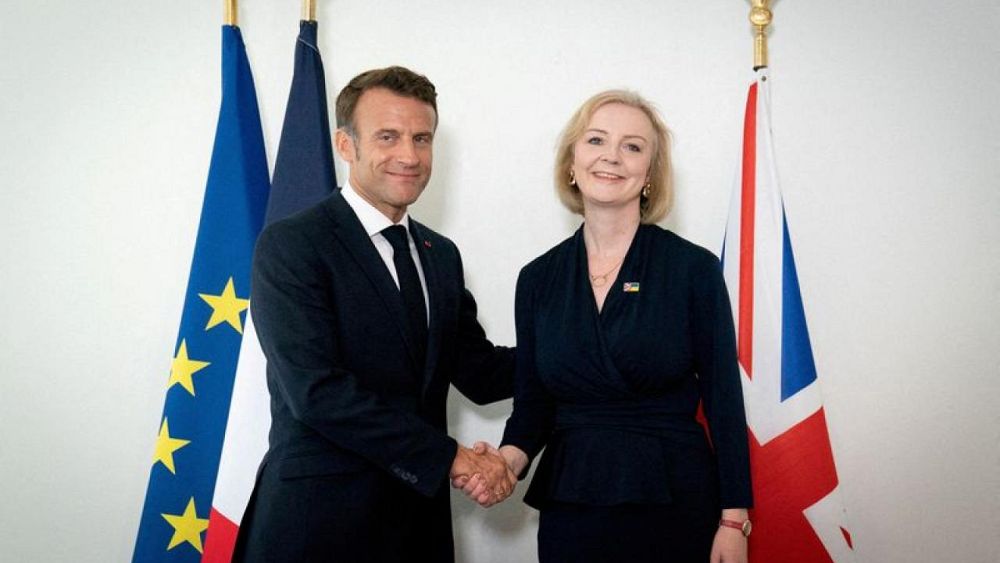By Michel Rose and John Irish
PARISOct 3 – British Prime Minister Liz Truss’ decision to participate in this week’s inaugural summit of pan-European groupings has given impetus to the initiative, an idea by French President Emmanuel Macron that has been rejected by some as one more meeting.
European Political Community Summit in Prague (CPC) will bring together 27 EU leaders with 17 leaders from continents currently outside the bloc, including the UK, Turkey, Norway and Ukraine.
Truss’ decision to attend Thursday’s meeting gives Britain the opportunity to form a new European forum from within after Brexit and could shift the spotlight away from financial and political turmoil at home.
“The UK is taking a very pragmatic tactic: if you can’t ‘kill’ this strange initiative, it’s better to get fully involved and run it your way,” a European diplomat told Reuters.
Diplomats say the purpose of CPC it is not at all clear and there is much doubt that, with so many people around the table -both foes and friends-, it will survive, despite the fact that it will address issues that concern everyone: energy, security and immigration.
One of Macron’s main goals is to reach out to EU candidate states that are losing patience waiting to join the bloc and thus counter Russian and Chinese attempts to gain influence on the continent’s southern and eastern fringes.
“One of the points is to be able to tell Kosovo and Albania that we can do something with them and that they shouldn’t just rely on Russia and China to invest,” a French official said.
Macron fears that the long road to meeting EU membership criteria could turn off Western Balkan countries, fueling populism and Euroscepticism.
France also believes it is important to have a forum to discuss security with Britain, another major European military power, or energy with Norway, which is currently helping Europe stop using Russian gas.
“BLA, BLA“
But Macron’s lofty ideals of a happy “European family” are not widely shared.
His proposal was initially viewed with suspicion by Eastern European countries, and Ukraine in particular, who suspected it was a ploy by France, long reluctant to admit more countries to the EU, to keep them in a kind of “purgatory”. .
French officials denied that this was the case and tried to reassure them.
“At first we were afraid that CPC It was an alternative to joining the EU, but the way things are going now, I don’t think so,” said an Eastern European diplomat.
However, expectations remain low.
“This will just be another forum to discuss ‘blah blah’, (…) but after a few meetings it could end without great success”, added the Eastern European diplomat.
“There are too many countries with too many interests. (…) How can you have Serbia and talk about Russia? How to unify Turkey and Greece/Cyprus? How to get Armenia and Azerbaijan to be on the same table?
The French realized that, without a clear agenda, many believed the meeting to be nothing more than a large family photo of the leaders at Prague Castle.
However, he is pleased that Ukraine has put forward a proposal on what CPCand Moldova, who have offered to host the summit of the two groups.
Another French diplomat said that some concrete initiatives could emerge from the forum, such as university cooperation after Britain left the Erasmus exchange program or even free telephone tariffs in member states.
European diplomats believe the move also has the advantage of bringing Turkish President Tayyip Erdogan closer to Europe and further away from Russia.
Turkey, initially annoyed by France’s concerns, has finally accepted the invitation and will attend, but has warned the European Union not to believe that Ankara will give up its hopes of one day joining the club. It has been 23 years since you started accession negotiations with the EU.
Prior to the Prague summit, some European diplomats recalled another French initiative, launched with great fanfare more than a decade ago by President Nicolas Sarkozy, which was forgotten.
“Like the Mediterranean Union, it would be a big French project with no big success, no real impact,” said a Baltic diplomat.

“Web specialist. Incurable twitteraholic. Explorer. Organizer. Internet nerd. Avid student.”






